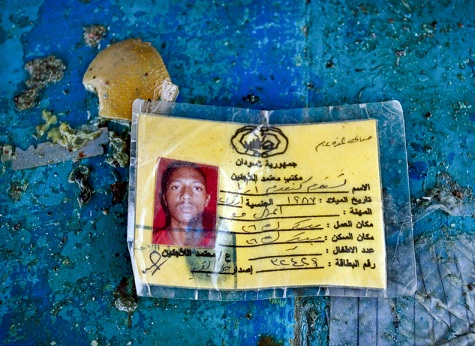 |
| photo by Mashid Mohadjerin |
This is how it works: you arrive in Lampedusa from Libya. They get you to seek asylum without you understanding any part of the process. Then you’re sent to a cabin in the Alps. You eat and drink at the expense of the state, mainly because by law you are forbidden to work. If you're lucky you have satellite television, cigarettes, Italian language courses and vocational training. If you’re not lucky, you don’t even get that. Until one day they call you before a commussion for an interview. And then, once again without understanding anything, you end up on the streets within a few days. No suitcases and no friends, just like the day you arrived in Lampedusa a year earlier. It is the great paradox of Italian hospitality. Or rather, the big scam.
Yes, because we are talking about 17,500 Euros per year (48 Euros per day) for each guest, while they wait for the State to bless their illegality. Reception services, mediation, Italian courses, vocational training, all in vain. Because those people will soon end up on the streets. Yes, because everyone who arrived in Lampedusa from Libya was asked to seek political asylum. And now that the hearings begin at the regional commissions that grants refugee status, it’s clear it wasn’t such a good idea.
In fact, none of the refugees were ever involved in politics nor did they suffer repression for their ideas. And practically no one is Libyan, they are all African and Asian. Simple workers who were living permanently in Tripoli and had to flee after the war began. Some of their own will, others were simply deported to Italy by the Gaddafi’s troops. Reason why the Italian bureaucracy today sees no obstacles to their expulsion.
With the exception of Somalis, Eritreans and Ivorians- whose countries of origin are still unstable- the request for asylum of most other refugees is bound to be refused. That does not mean repatriation. But something much worse. It means having to go ‘underground’. Staying in a country, Italy, without the possibility of working, or studying, or renting a home. Living without the possibility of existing. With the constant fear of being stopped by the police for an identity check. After the fact that, for the management of their lives, the reception circuit was funded. Mind you, nothing new compared to what happened in the past. The thousands of undocumented Ghanaians and Nigerians of Castel Volturno, Caserta, to give an example, are all former asylum seekers who landed in Lampedusa and were left to fend for themselves following an asylum refusal, and after having spent a year in the reception centres of Bari or Crotone . But perhaps it's time to put an end to all this.
Because for the first time the contradictions of the system are visible to everyone. Because for the first time the ones managing the reception process are not big cooperatives forced to keep quiet by the need to renew contracts with the Prefectures worth millions. Instead, it’s hundreds of associations and thousands of support workers in good faith. To whom we ask loudly to take action. To not be accomplices, useful idiots at the service of the factory of illegality.
There is an online petition, launched by the website Melting Pot. It's called "Diritto di Scelta’’ (Freedom of Choice). It demands that the government, as provided by law, grants a temporary residence permit on humanitarian grounds to all the refugees from Libya. Exactly as was done in April with 14,000 Tunisians. It will be up to them, at that point, to deicde what to do with their lives. Stay in Italy despite the crisis, try to continue their journey to reach friends scattered across Europe. Or instead – which would probably be the best choice for many - return to Libya or to their own countries, if they cannot find proper working conditions here. This would also help Italian accounts. Since it makes no sense to spend 1,400 Euros a month to accommodate a person who is, at the same time, forbidden by law to work.
So far nearly three thousand people have signed the petition, but thousands more are needed if we want to make our voice heard with the government. Possibly before another 20,000 people end up on the outskirts of our cities. Trapped in Fortress Europe. Forced to take shelter in the squats of busy cities, forced to queue in line in front of the bosses, first for one-day jobs on construction sites, then in tomato fields, and finally in the circuits of petty crime. After hundreds of millions of Euros have been invested for the management of their lives.
DIRITTO DI SCELTA – FREEDOM OF CHOICE. SIGN THE PETITION
HUMANITARIAN PERMITS FOR THE REFUGEES OF THE WAR IN LIBYA
MORE
WHO ARE THE AFRICAN REFUGEES OF THE WAR IN LIBYA
translated by Camilla Gamba